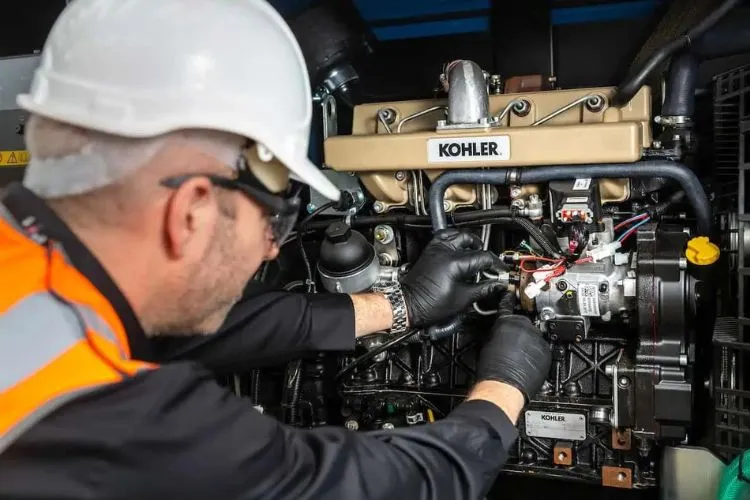In the quest for greater efficiency and cost-effectiveness, knowing how to reduce generator fuel consumption stands out as a critical consideration for businesses and individuals alike.
This endeavor not only promises significant savings but also aligns with the broader environmental objective of minimizing fossil fuel dependency.
The following guide presents a structured approach to achieving improved fuel efficiency in generators through various strategies, maintenance tips, and the adoption of smart technologies.

Understanding Generator Fuel Consumption
Types of Fuel Used in Generators
Generators commonly run on diesel, gasoline, propane, or natural gas. Each fuel type has its own set of advantages and efficiency levels.
Diesel generators, for instance, are known for their durability and typically higher efficiency, allowing them to produce more power per gallon of fuel than their gasoline counterparts.
Factors Affecting Fuel Consumption
Several factors influence a generator’s fuel consumption.
These include, the engine size and design, which dictate the fuel efficiency; the fuel quality, with higher quality fuel typically leading to better performance; the generator’s load, as running at full capacity can be less efficient; maintenance status, since poorly maintained generators consume more fuel; and environmental conditions, with external temperatures affecting fuel efficiency.
How To Reduce Generator Fuel Consumption?
Optimize Generator Size and Capacity
Choosing the right generator size is crucial for efficiency. An oversized generator will consume more fuel than necessary, while an undersized one may wear out quickly due to overloading.
Assessing power needs accurately enables the selection of a generator that matches the required capacity, thus avoiding wasteful consumption.
Regular Maintenance and Servicing
Routine maintenance is key to ensuring a generator runs efficiently. This includes checking air filters, changing oil regularly, and examining fuel lines for leaks.
Such practices help in maintaining optimal performance, which in turn reduces fuel consumption.

Managing Generator Load
Balancing the load on a generator ensures it runs at optimal efficiency. Avoiding both underloading and overloading can prevent unnecessary strain and fuel waste.
Using a load bank test can help identify the most efficient load level for your generator.
Utilize Smart Technologies
Incorporating automation and smart control systems offers a sophisticated way to manage generator fuel consumption.
These technologies adjust the load dynamically and ensure the generator operates at its most efficient point, thereby saving fuel.
Improve Fuel Quality
The quality of fuel plays a significant role in generator efficiency. Poor quality fuel can lead to engine clogging and increased consumption.
Using high-grade fuel and proper storage techniques can maintain its quality and ensure efficient operation.
Environmental Considerations
Placing generators in an optimal location can reduce energy waste. Also, operating them in favorable weather conditions, or at least adjusting for temperature effects, can enhance fuel efficiency.
Consider Alternative Power Sources
Exploring hybrid systems that incorporate renewable energy sources with traditional generators could yield substantial savings in fuel consumption.
These systems offer an environmentally friendly alternative to conventional power generation methods.
Pros and Cons of Reducing Fuel Consumption
Pros
✅ Cost Savings: Lower fuel consumption leads to significant cost reductions in the long run.
✅ Environmental Protection: Reduces carbon footprint and promotes sustainability.
✅ Extended Generator Lifespan: Operating efficiently can prolong the life of generators.
Cons
❌ Initial Investment: Upfront costs for smart technologies can be substantial.
❌ Increased Maintenance: May require more frequent checks and maintenance to ensure efficiency.
❌ Technical Challenges: Implementing and managing new technologies demands expertise and can present operational hurdles.
Safety Considerations in Fuel Handling and Storage

- Use Approved Containers: Store fuel in containers designed for their specific type, ensuring safety and compliance.
- Maintain Proper Storage Conditions: Keep fuel in cool, ventilated areas away from direct sunlight to prevent degradation.
- Regular Inspections: Check tanks and containers regularly for leaks or damage.
- Safety Equipment: Equip storage areas with appropriate fire extinguishers and spill containment materials.
- Proper Handling: Always use protective gear to avoid direct contact with fuel, preventing health risks and ensuring efficient handling practices.
Case Studies
A construction company implemented automated load management systems that reduced generator fuel consumption by 20%.
Key insights include the importance of real-time data for optimizing load and scheduling maintenance based on usage patterns rather than fixed intervals, significantly extending fuel efficiency and reducing operational costs.
Frequently Asked Questions (FAQs)
How much can I expect to save by optimizing my generator’s fuel consumption?
Savings can vary based on the size of the generator, the extent of optimization, and the specific strategies implemented. However, users often report significant reductions in fuel costs.
Will using a fuel additive help in reducing fuel concealment?
While fuel additives can improve performance in some cases, the primary focus should be on using high-quality fuel and maintaining the generator properly.
How often should I service my generator to ensure optimal fuel consumption?
The frequency of servicing can depend on the generator’s make and model as well as its usage patterns. Consult the manufacturer’s guidelines and consider regular checks by a professional.
Can I retrofit my old generator to make it more fuel-efficient?
Yes, there are retrofit options available that can improve fuel efficiency, such as upgrading components or installing smart control systems.
What is the most fuel-efficient type of generator?
Diesel generators are generally more fuel-efficient than gasoline models, but the specific efficiency can vary by make, model, and usage.
Conclusion:
Reducing generator fuel consumption is an achievable goal with numerous benefits.
By understanding the factors that affect fuel usage and implementing targeted strategies, generator users can enjoy reduced operating costs and contribute to environmental sustainability.
Regular maintenance, smart load management, and the use of high-quality fuels are tangible steps towards this objective.
As the demand for energy efficiency grows, adopting these practices will not only yield immediate savings but also position users as responsible energy consumers.
